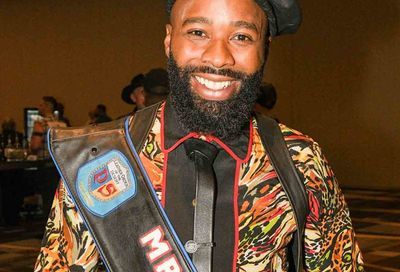Trump-appointed judge says professor has First Amendment right to misgender trans student
6th U.S. Circuit Court of Appeals restores professor's lawsuit over being compelled to refer to student using female pronouns

A federal appeals court has restored a lawsuit brought by a college professor who sued after being disciplined for refusing to address a transgender student using female pronouns.
Circuit Judge Amul Thapar, a Donald Trump appointee, penned a unanimous decision on behalf of the three-judge panel finding that Nicholas Meriwether, a philosophy professor at Shawnee State University in Ohio, should be allowed to pursue a lawsuit against the school for disciplining him after he repeatedly misgendered a transgender student, in violation of the university’s nondiscrimination policy.
Joined by Trump appointee Joan Larsen and George W. Bush appointee David McKeague, Thapar — who, in oral arguments, according to Slate, compared the university’s policy on preferred pronouns to compelling a Jewish professor to call a student ‘my Fuhrer’ — adopted the view that the professor’s right to express his personal feelings about gender supersede the university’s attempt to prevent discrimination or the right of a transgender student to not be outed, misgendered, or demeaned in class because of her gender identity.
“Traditionally, American universities have been beacons of intellectual diversity and academic freedom…. They have tried not to stifle debate by picking sides,” Thapar wrote on behalf of the court. “But Shawnee State chose a different route: It punished a professor for his speech on a hotly contested issue.”
Meriwether became enmeshed in the controversy after he balked at a 2016 policy adopted by the university requiring professors to use students’ preferred pronouns.
According to Meriwether, he believes a person’s gender is fixed at birth, as determined by their genitalia, and “cannot be changed, regardless of an individual’s feelings or desires.”
Two years later, Meriwether misgendered a transgender female student in class, claiming he did so inadvertently because “no one would have assumed” the student was female.
The student, known as Jane Doe, demanded that Meriwether refer to her using female pronouns, just as he uses “Mr.” or “Ms.” to refer to other students. After Meriwether refused, Doe responded: “Then I guess this means I can call you a cunt.”
Meriwether reported the incident, and his dean sought a compromise of eliminating all gendered language from the classroom. But Meriwether refused, instead choosing to call other students by their gender-specific honorifics while referring to Doe by her last name only. Doe complained, and the dean asked him to recognize her as a woman.
In response, Meriwether said he might comply if he could add a disclaimer in his syllabus stating that he used preferred pronouns “under compulsion” and describing his personal objections to transgender identity. The dean rejected his terms, so Meriwether continued his behavior.
The university subsequently launched a Title IX investigation into the ongoing fight, finding that Meriwether had violated the school’s nondiscrimination policy and placing a written warning in Meriwether’s personnel file.
See also: Nonbinary student goes viral after calling out professor who refused to use correct pronouns
Meriwether then sued, alleging that the school was infringing on his First Amendment rights by compelling speech he disagrees with, and his religious freedom, claiming the school’s policy on pronouns opens the door to targeting Christians who refuse to condone homosexuality or transgenderism due to their personal religious beliefs.
In an in-depth 62-page report, Magistrate Karen Litkovitz said the professor was a public employee carrying out his official duties, and his employer was allowed to limit his speech in the context of his role as a professor through its nondiscrimination policy, according to The Cincinnati Enquirer.
In her report, Likovitz found that even though debates over gender identity are a matter of public concern — a standard under which Meriwether’s speech would normally be protected — the case focused on his treatment of Doe, and not his ability to debate transgenderism.
Those findings were adopted by U.S. District Court Judge Susan Dlott, who dismissed the lawsuit. Meriwether then appealed the decision to the 6th Circuit.
But the judges on the federal appeals court felt differently, restoring Meriwether’s lawsuit against the university on the grounds that his refusal to address Doe with female pronouns or honorifics was in itself a form of protected speech.
“The university wants its professors to use pronouns to communicate a message: People can have a gender identity inconsistent with their sex at birth,” Thapar wrote. “But Meriwether does not agree with that message, and he does not want to communicate it to his students…. Through his continued refusal to address Doe as a woman, he advanced a viewpoint on gender identity.”

Thapar also alleged that university officials demonstrated “religious hostility” through comments they made while trying to resolve the dispute between Meriwether and Doe, such as comparing Meriwether’s misgendering of Doe to “religiously motivated racism or sexism.”
He also rejected the idea that the university might have a compelling interest in stopping anti-trans discrimination, effectively arguing that any nondiscrimination policy, no matter how neutral, could “transform institutions of higher learning into ‘enclaves of totalitarianism.'”
“Public universities do not have a license to act as classroom thought police. They cannot force professors to avoid controversial viewpoints altogether in deference to a state-mandated orthodoxy,” Thapar added. “Otherwise, our public universities could transform the next generation of leaders into ‘closed-circuit recipients of only that which the State chooses to communicate.'”
The case now heads back to the lower courts, who will hear evidence on the merits of Meriwether’s claims that the university’s policy infringes upon his rights to free speech and free exercise of religion. A court date has not yet been set for future proceedings.
Read more:
Pentagon issues new guidance allowing transgender troops to serve openly
LGBTQ students from faith-based colleges sue Education Department for discrimination
South Dakota governor signs anti-trans executive orders after ban on trans athletes fails
Support Metro Weekly’s Journalism
These are challenging times for news organizations. And yet it’s crucial we stay active and provide vital resources and information to both our local readers and the world. So won’t you please take a moment and consider supporting Metro Weekly with a membership? For as little as $5 a month, you can help ensure Metro Weekly magazine and MetroWeekly.com remain free, viable resources as we provide the best, most diverse, culturally-resonant LGBTQ coverage in both the D.C. region and around the world. Memberships come with exclusive perks and discounts, your own personal digital delivery of each week’s magazine (and an archive), access to our Member's Lounge when it launches this fall, and exclusive members-only items like Metro Weekly Membership Mugs and Tote Bags! Check out all our membership levels here and please join us today!





























You must be logged in to post a comment.